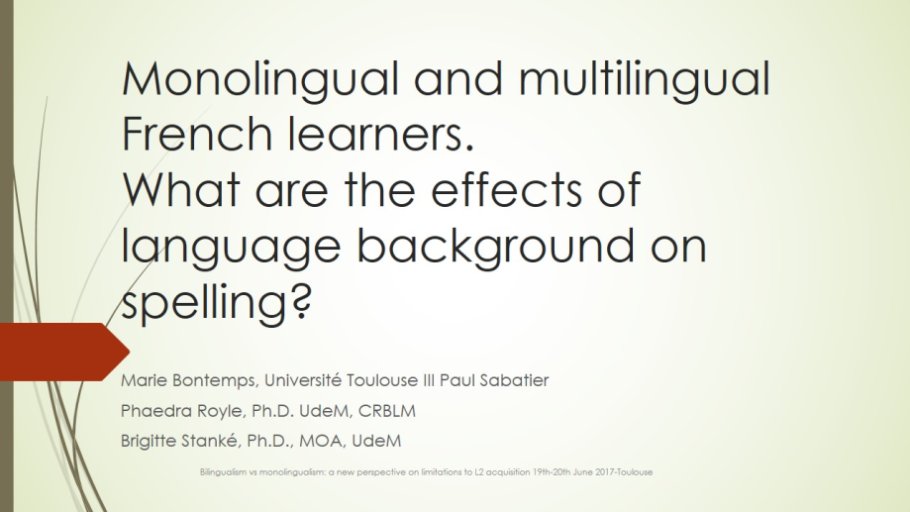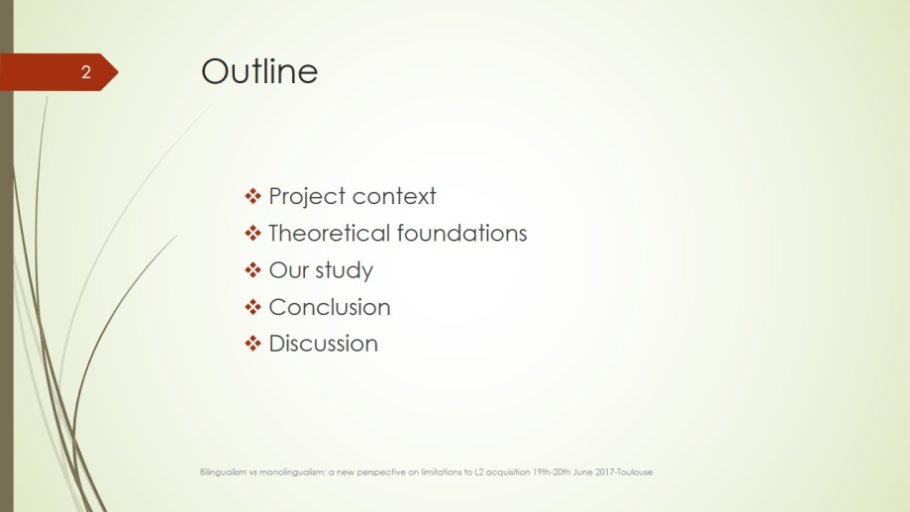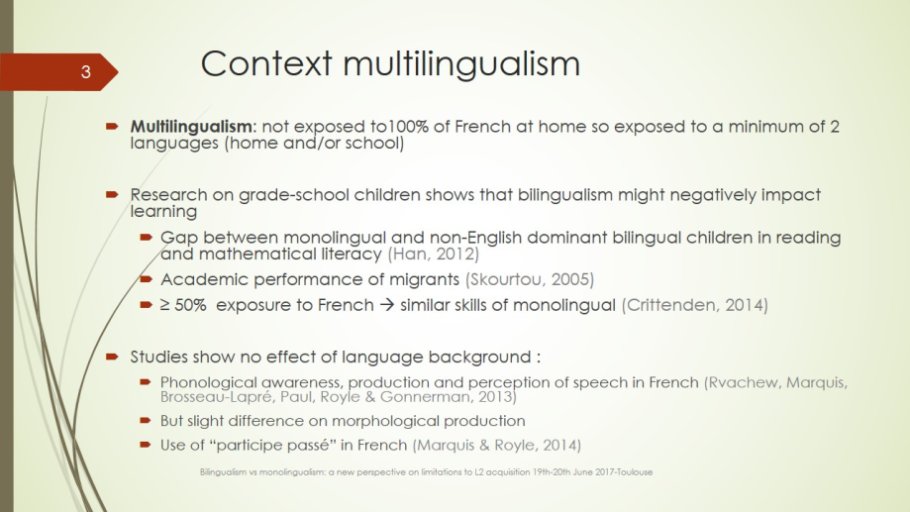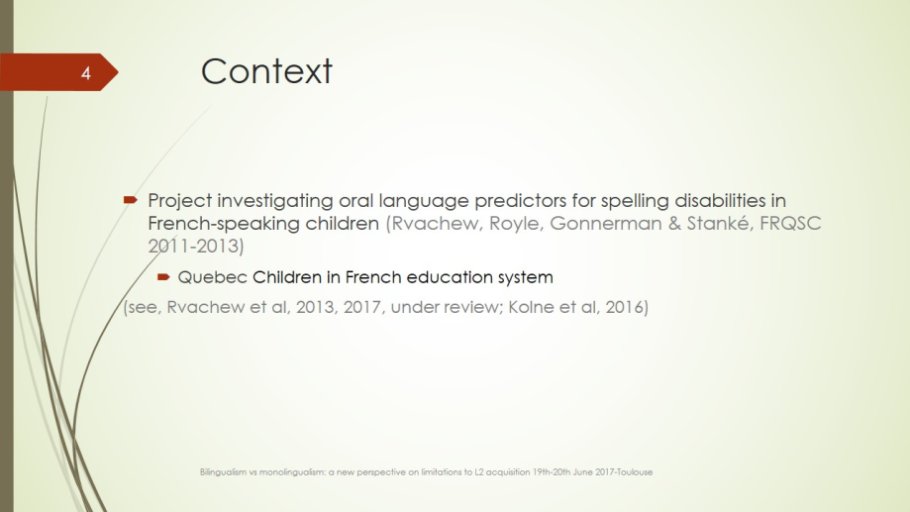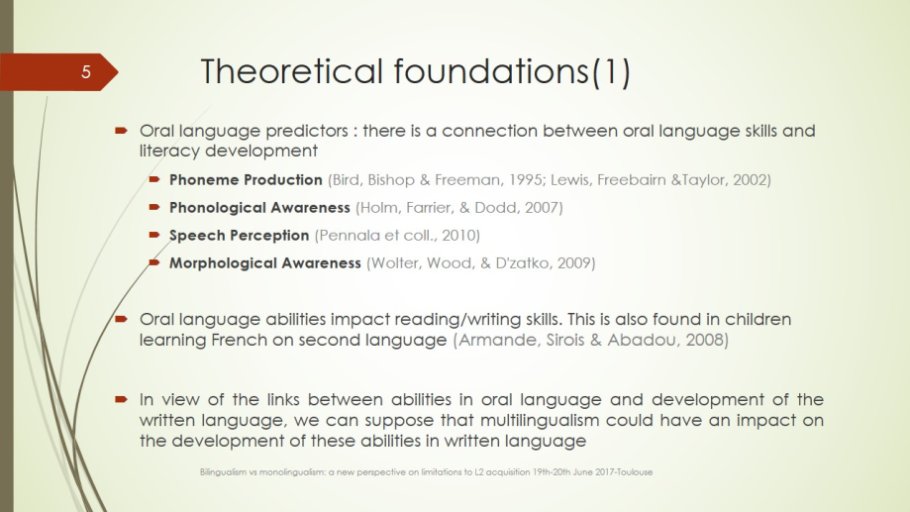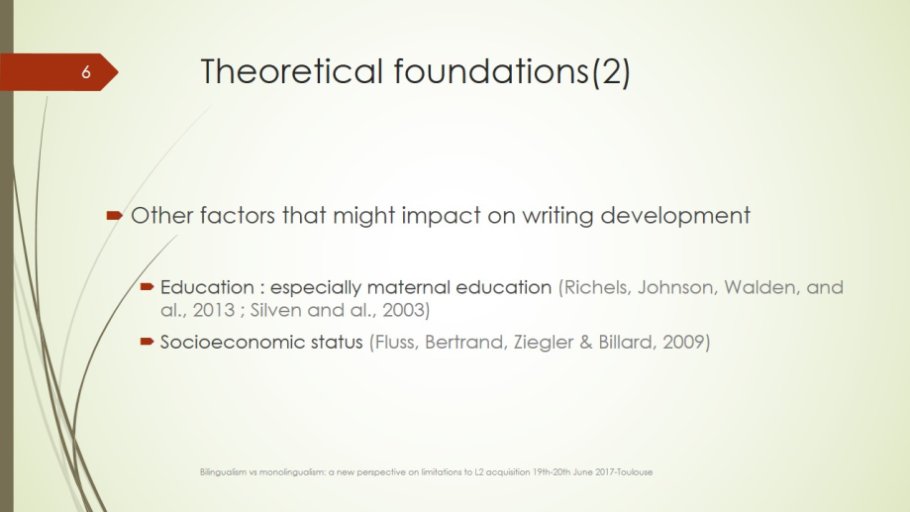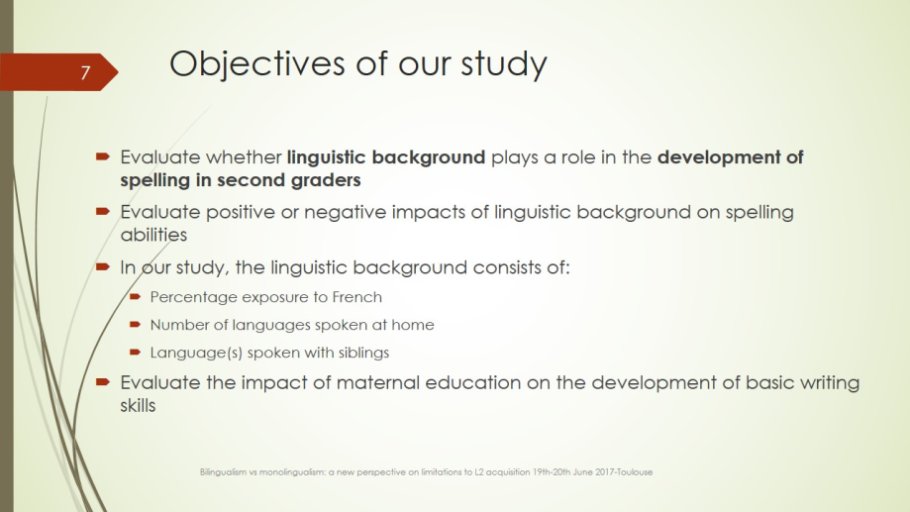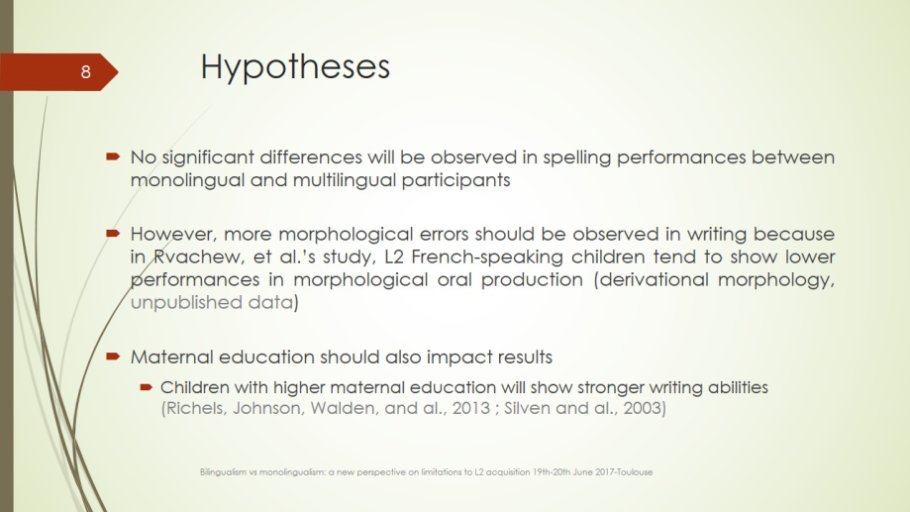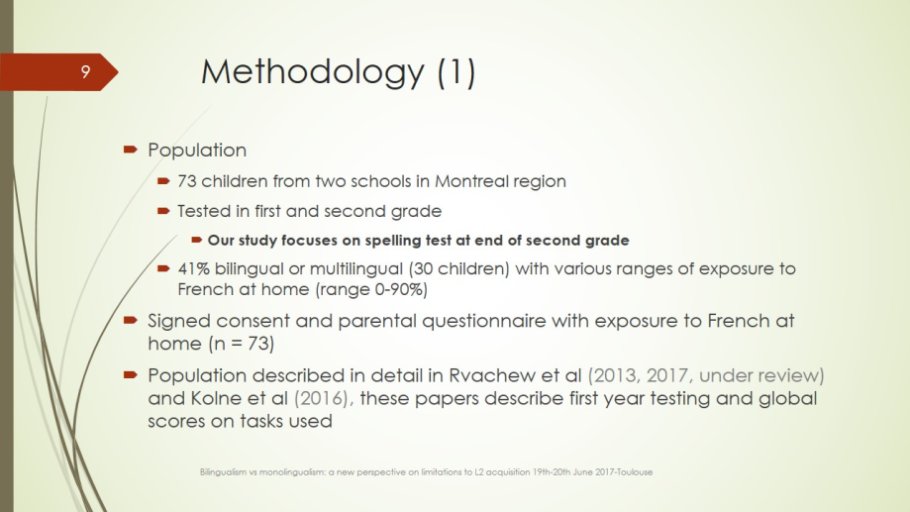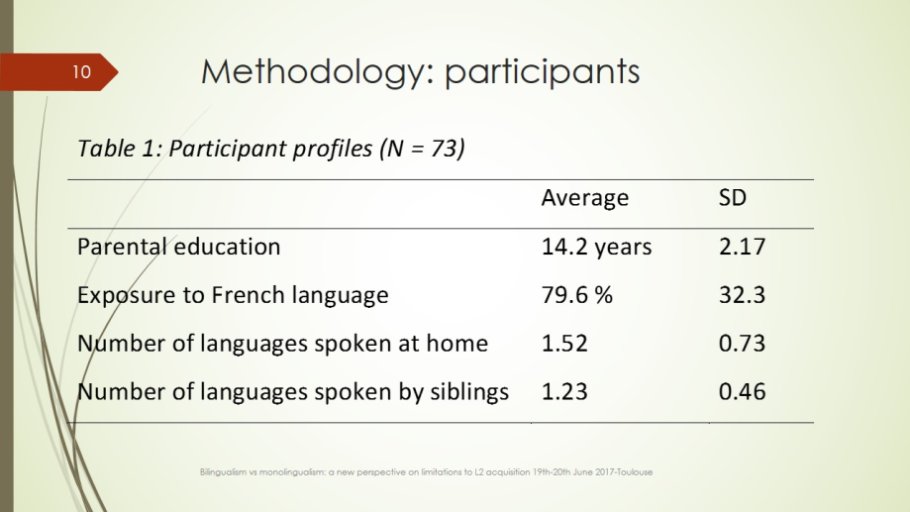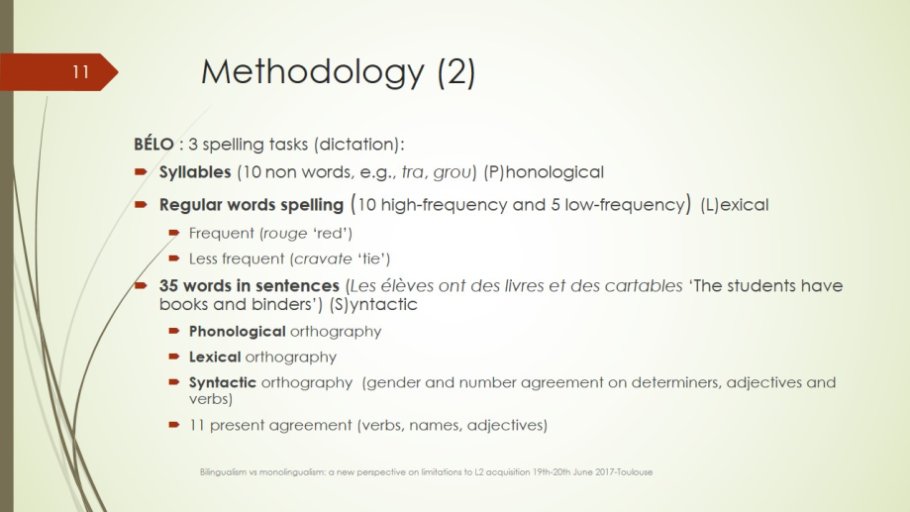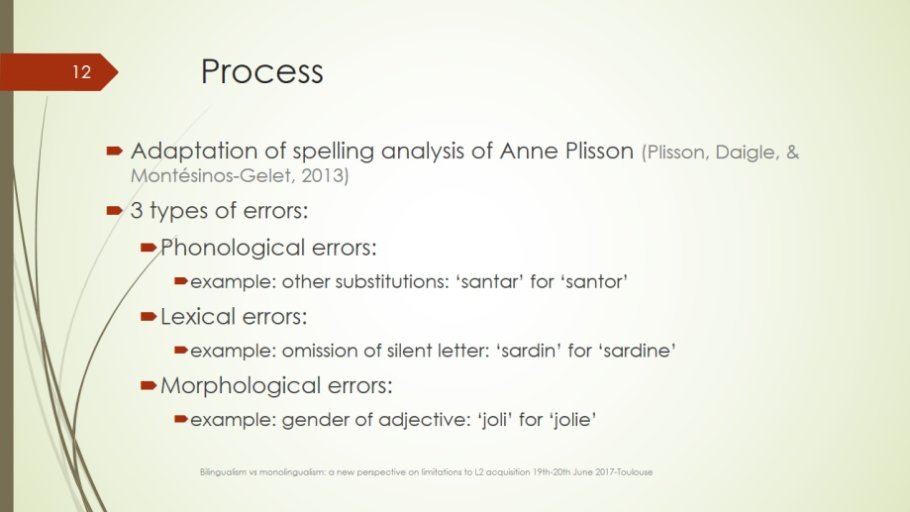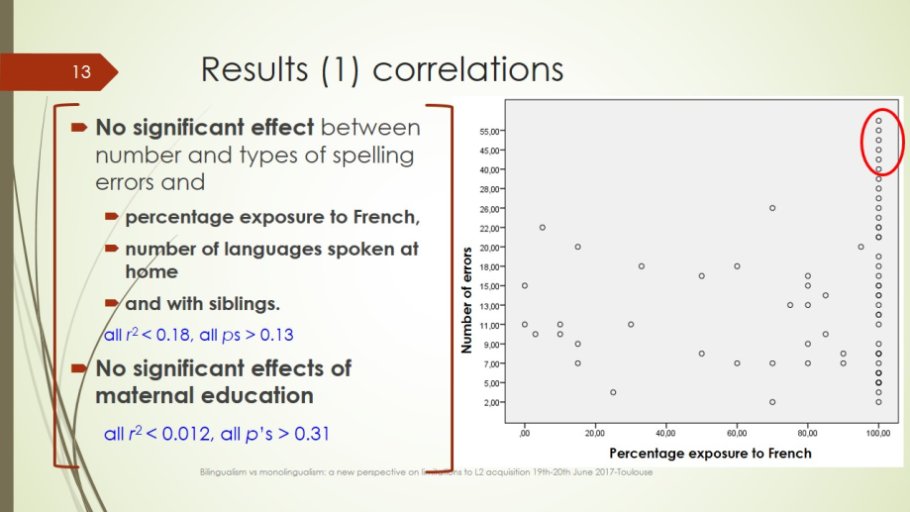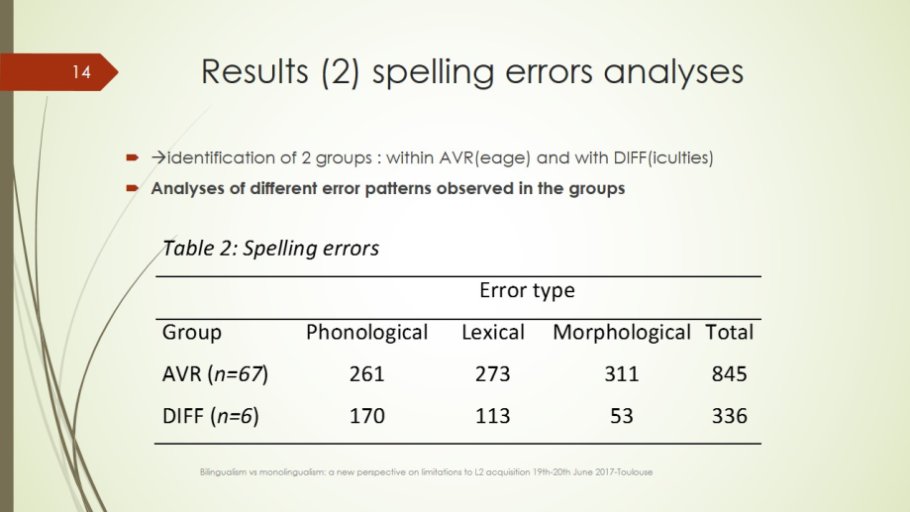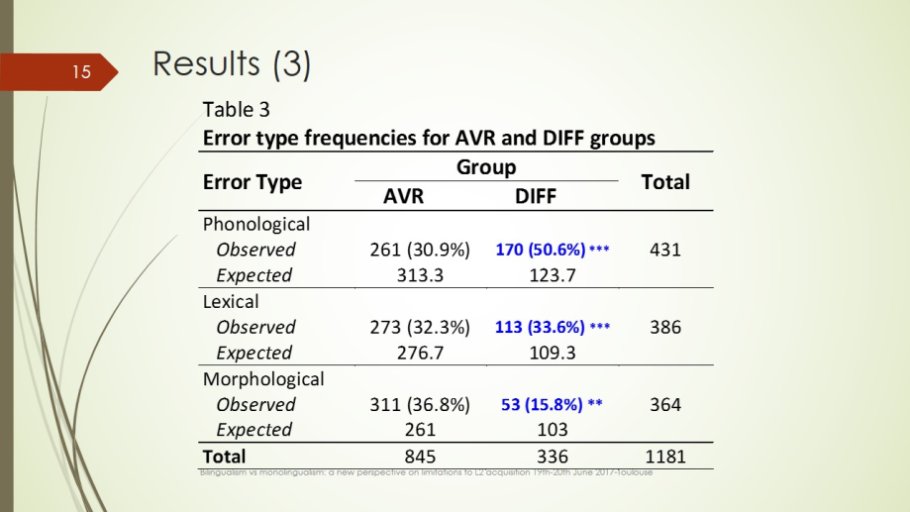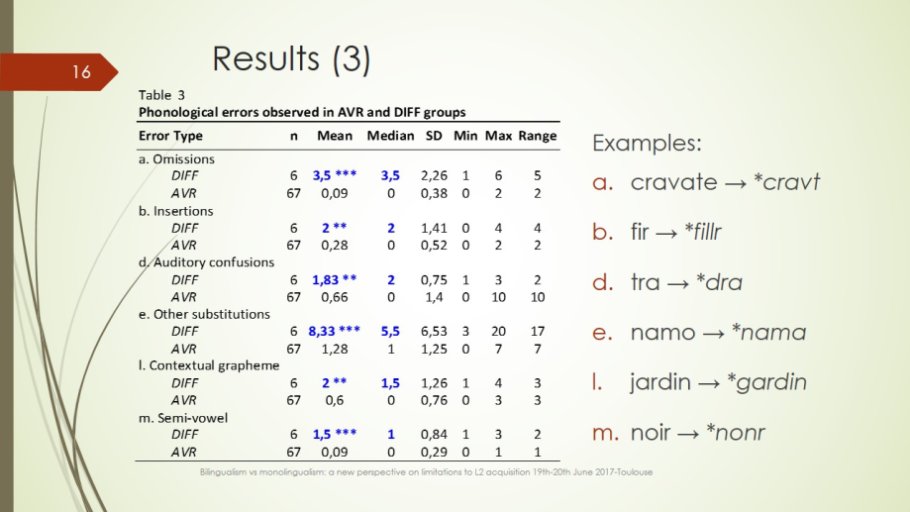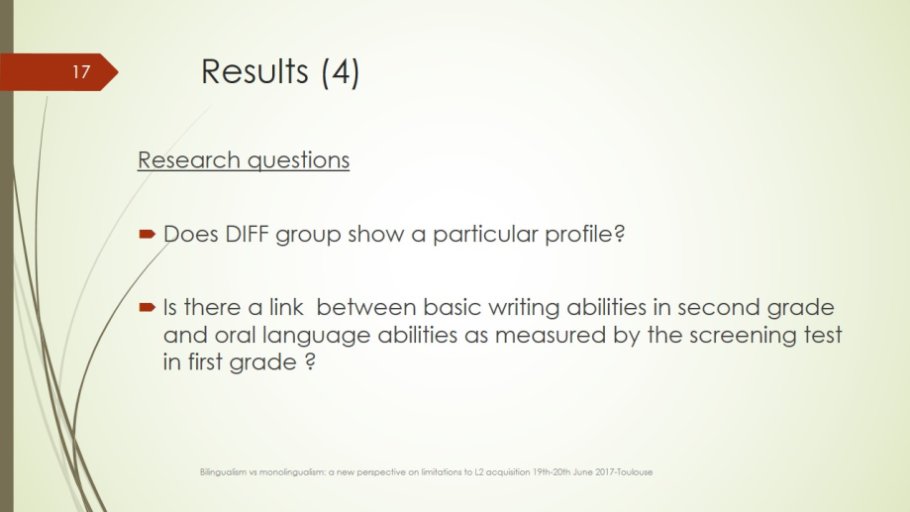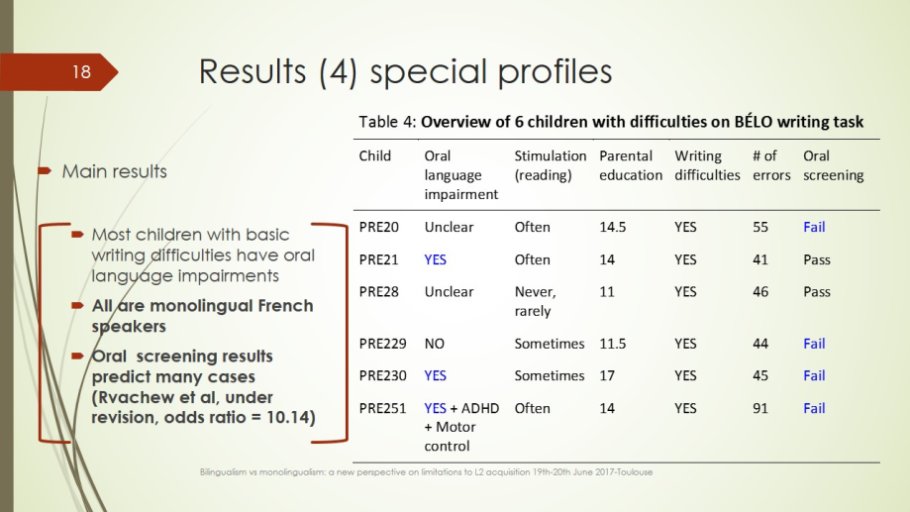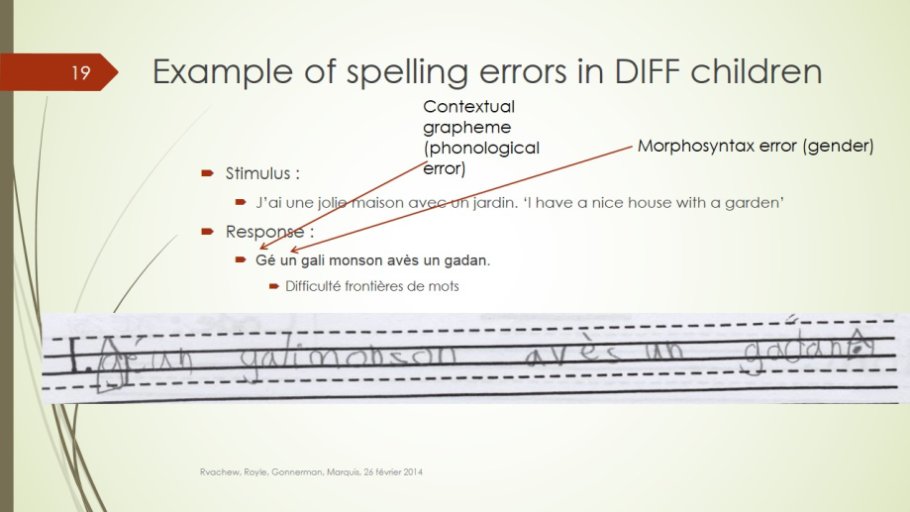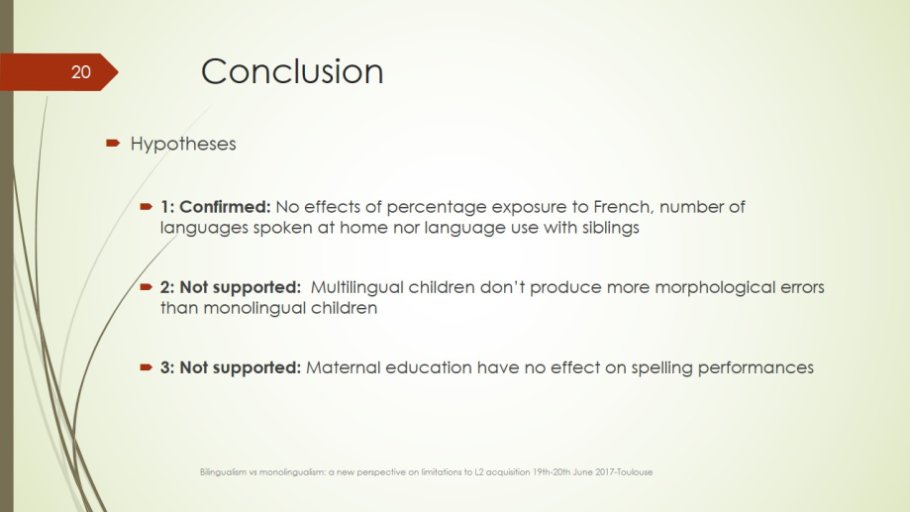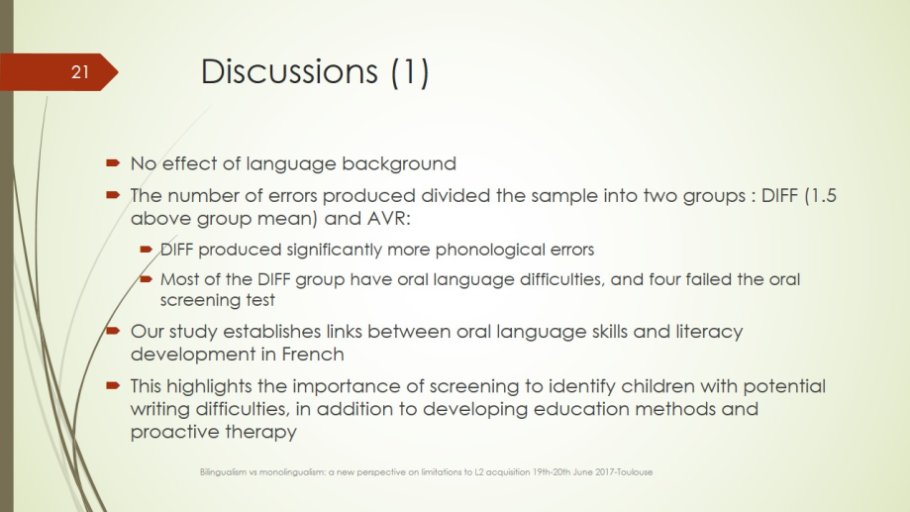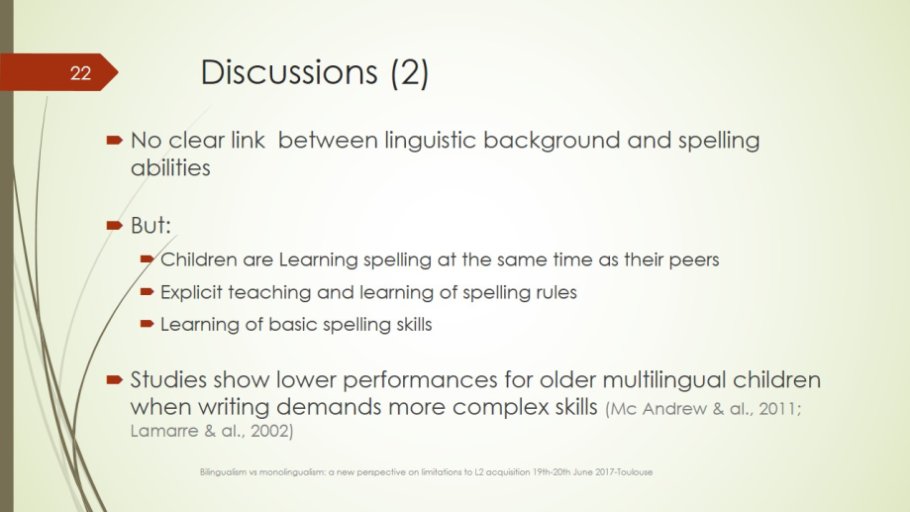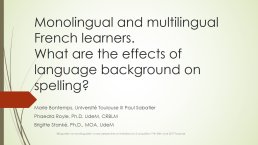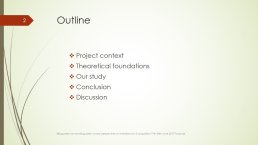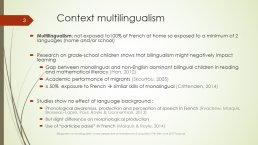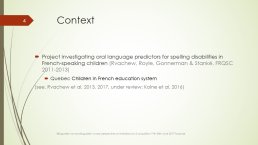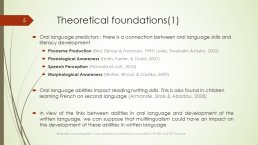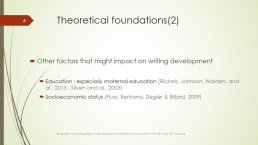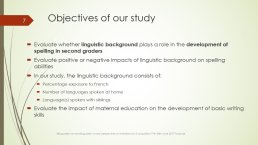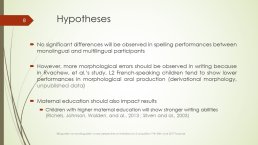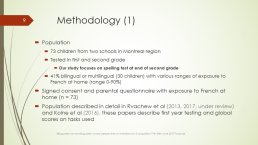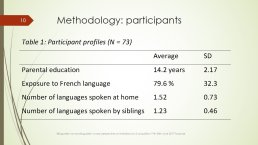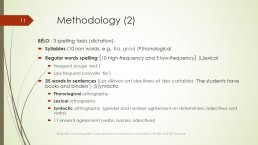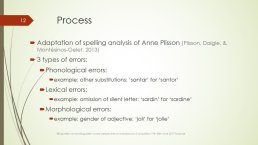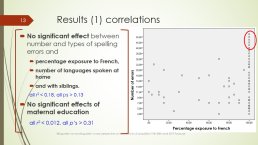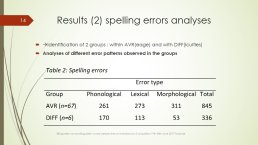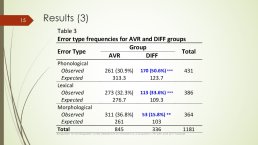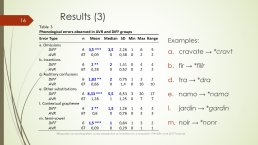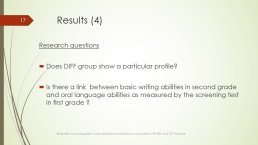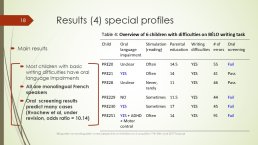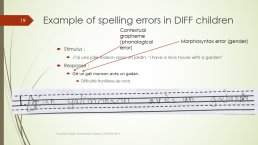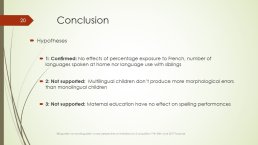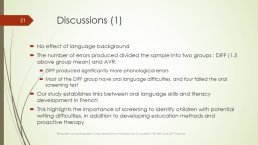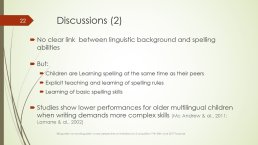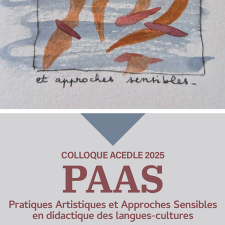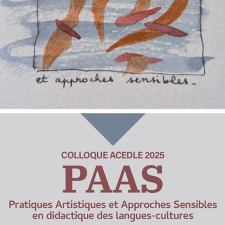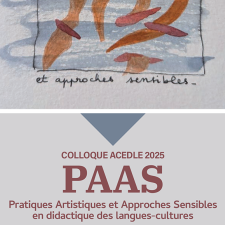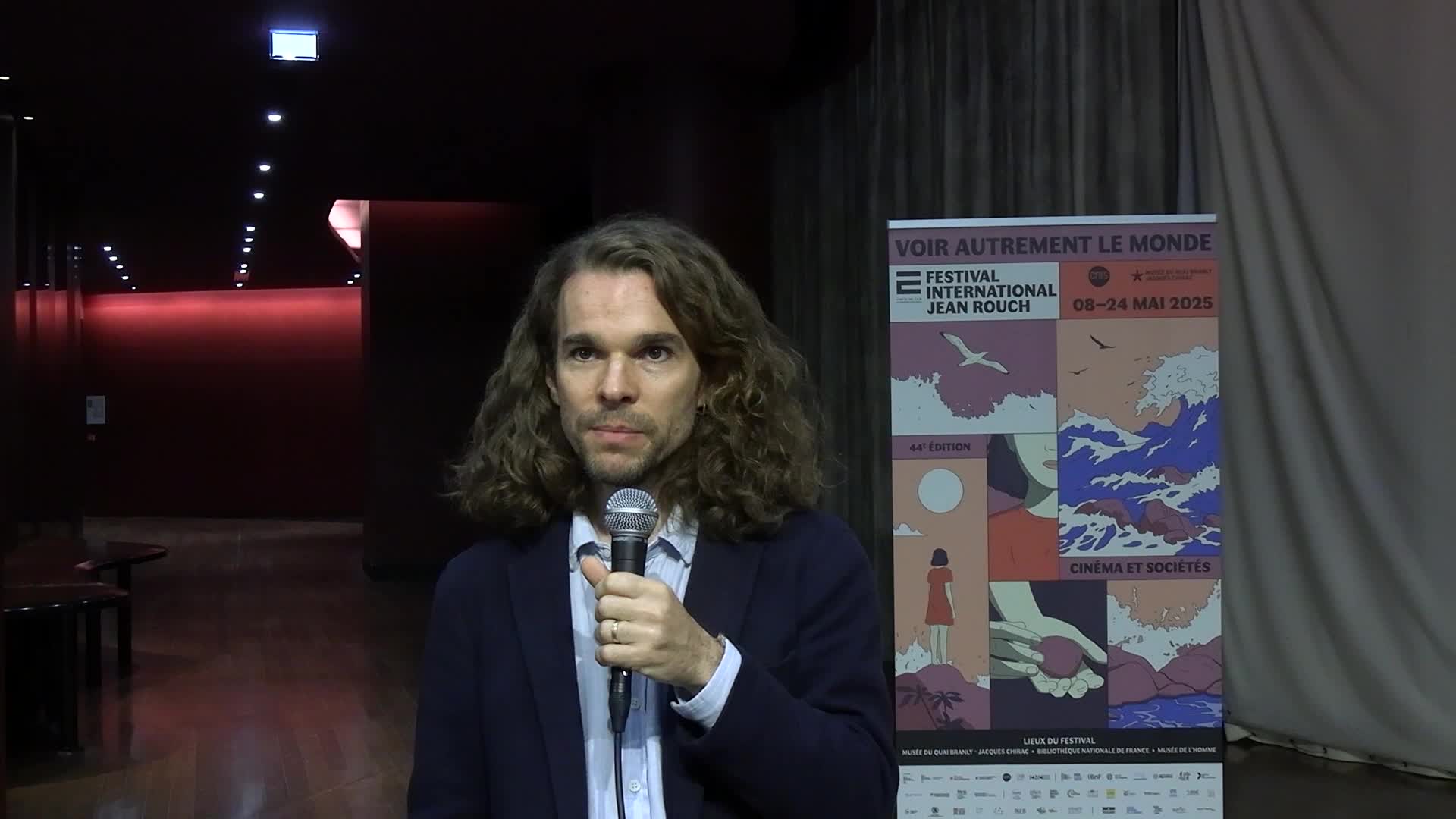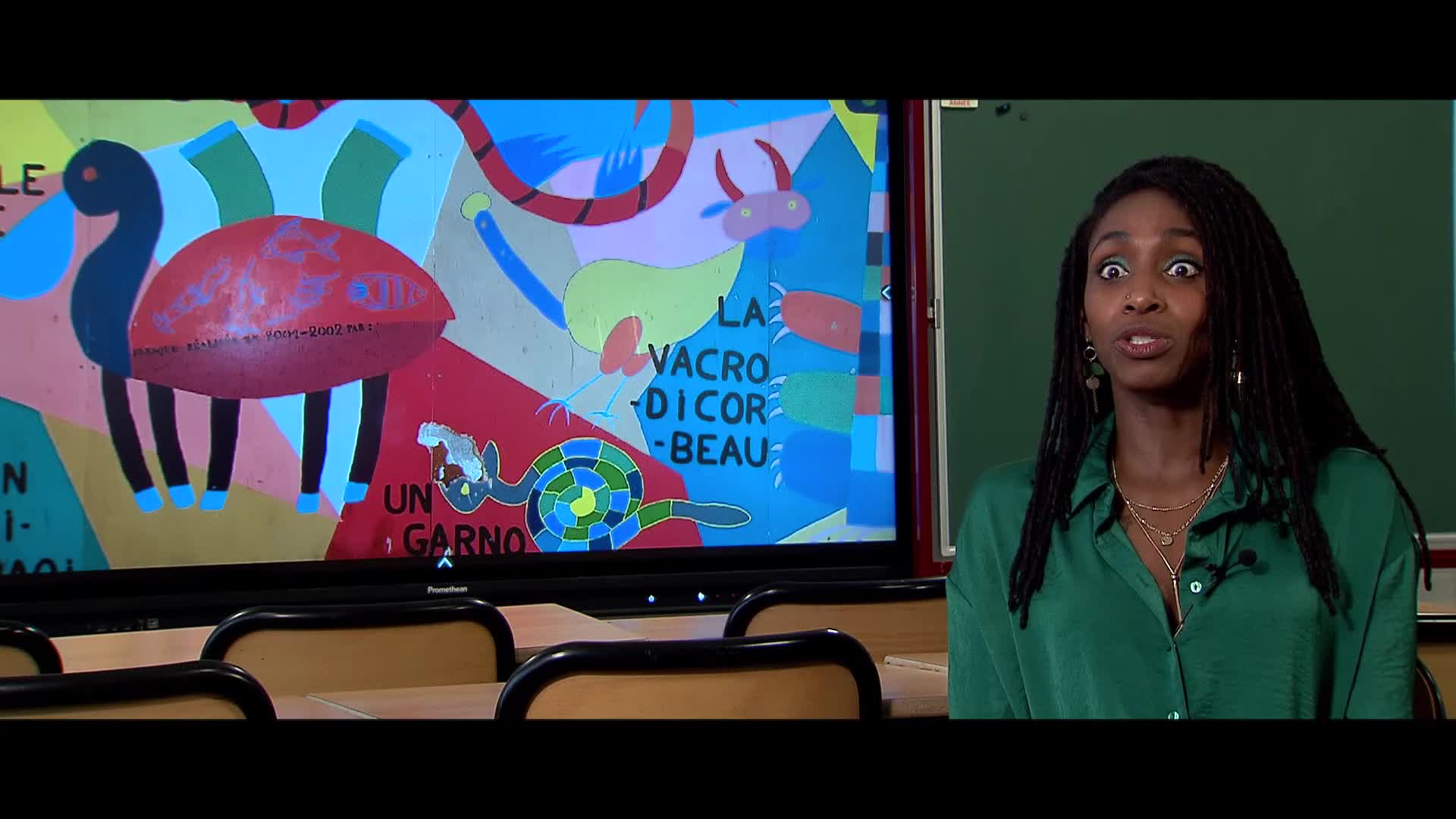Notice
Monolingual and multilingual learners of French. What are the effects of language background on spelling? / Marie Bontemps
- document 1 document 2 document 3
- niveau 1 niveau 2 niveau 3
Descriptif
Monolingual and multilingual learners of French. What are the effects of language background on spelling? / Marie Bontemps, in colloque "Bilingualism vs. monolingualism: a new perspective on limitations to L2 acquisition" organisé par le laboratoire Octogone-Lordat sous la responsabilité de Barbara Köpke (UT2J), Holger Hopp (Technische Universität Braunschweig), Tanja Kupisch (Universität Konstanz), Université Toulouse Jean Jaurès, 19-20 juin 2017.
Foran optimal learning of the written language, children have to master the orallanguage (Ouelette & Sénéchal, 2008). However, some studies show thatmultilingual children, who fully master their second language, encounter moredifficulties at school, in particular on reading (Han, 2012). Teachers tend tocategorize children from bi-/multilingual families as being at risk for writingdelays (Kolne et al, 2016). However, evidence shows that bilingualism might nothave a negative impact on decoding or spelling abilities (Bialystok et al,2012).
Thepurpose of this study is to evaluate the impact of oral language background andlanguage behaviour at home, or parentaleducation have on spelling in beginning writers of French. This study examined spelling knowledge usingthe BELO (George & Pech-Georgel, 2006) in 73 children (Table 1) at the end of 2nd grade. These children were recruitedfrom the French public school system in a suburb of Montreal, and exhibited awide range of immigration and linguistic profiles. Based on previous research(Han, 2012) we expected that slight differences between multilingual (MUL whospeak at least another language 10% to 100% of the time at home) and Frenchmonolingual (MON) participants would be seen on spelling errors.
Atelephone interview was conducted with parents to obtain demographic, literacy,health and language information via standard questionnaires. This interviewserved to identify parental education level, the number of spoken languages athome, languages spoken by siblings and exposure to the French language.
Todescribe the spelling errors found in the test, we developed an analyticalframework of spelling errors. These were grouped as phonological, lexical ormorphological. These data were then correlated with 1. parental education, 2.exposure to languages other than French, 3. number of spoken languages at homeor 4. number of languages spoken by siblings (Table 1).
Resultsshow no correlations between spelling abilities and the above-mentionedmeasures. Regardless of background, all children produce similar types andnumbers of spelling errors. We thus realised another analysis for spellingerrors on the BELO. Based on average number of errors two groups were formed;the first includes children within the average (AVR) and the second, thosebelow 1.5SD (DIFF). The DIFF group make many more errors than the AVR group, X2(2, N = 1187) = 58,24, p <.001 (Table 2). But also, makeatypical spelling errors signaling potential pathological behaviour. Errorpatterns will be discussed in our presentation.
Intervention / Responsable scientifique
Thème
Documentation
Bibliographie sélective
Caloi, Irene (2017). Additive focus particles in German-speaking learners of Italian as L2. In De Cesare, A. M., Andorno, C. M., Focus on additivity. Multiperspective and multifaceted views, Amsterdam, John Benjamins Publishing Company, 237-263.
Hernandez, Arturo E. (2009). Language switching in the bilingual brain: What's next?, Brain & Language, 109, 133-140.
Hofweber, Julia (2016). Effects of dense code-switching on executive control, in Irina A. Sekerina and Lauren Spradlin, "Bilingualism and Executive Function: An interdisciplinary approach", Linguistic Approaches to Bilingualism, 5, vol.6, 648–668.
Hopp, Holger & Schmid, Monika S. (2014). L'accent étranger perçu dans l'attrition L1 et l'acquisition de L2: l'impact de l'âge d'acquisition et du bilinguisme / Perceived foreign accent in L1 attrition and L2 acquisition, Psycholinguistique appliquée, 34 (2), 361-394. [En ligne : http://www.let.rug.nl/languageattrition/Papers/Hopp%20&%20Schmid%20forthc.pdf].
Kartushina, N., Frauenfelder, U. H. and Golestani, N. (2016), How and When Does the Second Language Influence the Production of Native Speech Sounds: A Literature Review, Language Learning, 52, vol. 66, 155–186. [En ligne : http://onlinelibrary.wiley.com/doi/10.1111/lang.12187/full].
Köpke, Barbara, Schmid, Monika (2011). L’attrition de la première langue en tant que phénomène psycholinguistique, Langage, Interaction and Acquisition / Language, Interaction et Acquisition (LIA), Amsterdam, John Benjamins Publishing Company, numéro spécial 2, vol. 2, 185-196.
Kupisch, T. (2012). Thèmes génériques en italien des premiers bilingues germano. Bilinguisme: Langue et Cognition 15 (4), 736-756.
Massa, E., Cortelazzo, F., El Yagoubi, R. & Köpke, B. (2016). Bilinguisme et contrôle exécutif : exploration neurofonctionnelle au moyen des méthodes potentiels évoqués et IRMf, Revue de Neuropsychologie, 2, 8, 126-136. {En ligne : http://www.jle.com/fr/revues/nrp/e-docs/bilinguisme_et_controle_executif_exploration_neurofonctionnelle_au_moyen_des_methodes_potentiels_evoques_et_irmf_307476/article.phtml].
Meisel, J. (2001). The simultaneous acquisition of two first languages. Early differenciation and subsequent development of grammars, in J. Cenoz & F. Genesee (éds.), Trends in Bilingual Acquisition, Amsterdam, John Benjamins Publishing Company, 11-41.
Meisel, J. (1989). Early differentiation of languages in bilingual children, in K. Hyltenstam & L. Obler (eds.), Bilingualism Across the Lifespan : Aspects of Acquisition, Maturity, and Loss, Cambridge, Cambridge University Press, 13-40.
Paradis, M. (2007). L1 attrition features predicted by a neurolinguistic theory of bilingualism, in B. Köpke, M. S. Schmid, M. Keijzer & S. Dostert (éds.), Language Attrition. Theoretical perspectives, Amsterdam, John Benjamins Publishing Company, 121-133.
Pérez-Leroux, A. T., Pirvulescu, M., & Roberge, Y. (2011). Topicalization and object omission in child language. First Language, 3, 31, 280-299. [En ligne : http://journals.sagepub.com/doi/pdf/10.1177/0142723710394384].
Royle, Phaedra, St-Denis, Ariane, Mazzocca, Patrizia, Marquis, Alexandra (2017). Insensitivity to verb conjugation patterns in French children with SLI, Clinical Linguistics & Phonetics. [En ligne : https://eoa.umontreal.ca/wp-content/uploads/sites/32/2017/07/publicationsRoyleP_verbConjugationPatternsFrenchSLI.pdf].
Rvache, S., Royle, P., Gonnerman, L. M., Stanké, B., Marquis, A., Herbay, A. (2017). Development of a Tool to Screen Risk of Literacy Delays in French-Speaking Children: PHOPHLO, Canadian Journal of Speech-Language Pathology and Audiology (CJSLPA), 3, vol. 41, 321-340. [En ligne : http://www.cjslpa.ca/detail.php?ID=1220&lang=en].
Sabourin, L. (2014). The bilingual advantage in the Stroop task: simultaneous vs. early bilinguals, in "L3 Acquisition: A Focus on Cognitive Approaches", Bilingualism: Language and Cognition, 2, vol. 18, 350-355.
Schmid, M.S. & Köpke, B. (2017). The relevance of first language attrition to theories of bilingual development. Linguistic Approaches to Bilingualism, 6, vol. 7, 637 –667 [En ligne : http://www.let.rug.nl/languageattrition/Papers/Schmid&Kopke2017.pdf].
Schmid, M S., Köpke, B., De Bot, K. (2013). Language attrition as a complex, non-linear development, International Journal of Bilingualism, 17 (6), 675-682.
Stoehr, A., Benders, T., Van Hell, J., & Fikkert, P. (2017). Heritage language exposure impacts voice onset time of Dutch–German simultaneous bilingual preschoolers, Bilingualism: Language and Cognition, 1-20. [En ligne : doi: 10.1017/S1366728917000116].
Stöhr, A., Akpınar, D., Bianchi, G., & Kupisch, T. (2012). Gender marking in L2 learners and Italian-German bilinguals with German as the weaker language, in K. Braunmueller & C. Gabriel (eds.), Multilingual Individuals Multilingual Societies, 153–170.
Van Osch, B. A., Aalberse, S. P., Hulk, A. C. J., & Sleeman, A. P. (2017). Knowledge of mood in internal and external interface contexts in Spanish heritage speakers in the Netherlands, in K. Bellamy, M. Child, M. C. Parafita Couto, P. González, & A. Muntendam (eds.), Multidisciplinary Approaches to Bilingualism in the Hispanic and Lusophone World, Amsterdam, John Benjamins Publishing Company, 67-94.
Dans la même collection
-
On Qualitative Differences between Types of Language Acquisition / Jürgen Meisel
MeiselJürgen M.On Qualitative Differences between Types of Language Acquisition / Jürgen Meisel, in colloque "Bilingualism vs. monolingualism: a new perspective on limitations to L2 acquisition" organisé par le
-
Attrition and (incomplete) acquisition of Italian answering strategies / Irene Caloi
Attrition and (incomplete) acquisition of Italian answering strategies / Irene Caloi, in colloque "Bilingualism vs. monolingualism: a new perspective on limitations to L2 acquisition" organisé par
-
Do temporarily induced code-switching modes alternate executive performance in late sequential bili…
Do temporarily induced code-switching modes alternate executive performance in late sequential bilinguals?
-
Processing variability in L2 learning: insights from articulatory training / Natalia Kartushina, Cl…
Processing variability in L2 learning: insights from articulatory training / Natalia Kartushina, Clara Martin
-
Age-related effects on language control and executive control: a behavioral-electrophysiological in…
MassaÉmilieAge-related effects on language control and executive control: a behavioral-electrophysiological investigation / Émilie Massa
-
Language, Development and the Bilingual Brain / Arturo E. Hernandez
HernandezArturo E.Language, Development and the Bilingual Brain / Arturo E. Hernandez, in colloque "Bilingualism vs. monolingualism: a new perspective on limitations to L2 acquisition" organisé par le laboratoire
-
Trilingual effects at the microstructure and macrostructure levels in children’s narratives / Mihae…
PirvulescuMihaelaTrilingual effects at the microstructure and macrostructure levels in children’s narratives / Mihaela Pirvulescu, in colloque "Bilingualism vs. monolingualism: a new perspective on limitations to L2
-
Language Processing in Bilinguals: Distinguishing Early Sequential from Simultaneous / Laura Sabour…
SabourinLauraLanguage Processing in Bilinguals: Distinguishing Early Sequential from Simultaneous / Laura Sabourin, Santa Vinerte, in colloque "Bilingualism vs. monolingualism: a new perspective on limitations to
-
Implicit causality as a predictive cue in child L1 and adult L2 processing of German: Evidence from…
Implicit causality as a predictive cue in child L1 and adult L2 processing of German: Evidence from visual-world eyetracking / Judith Schlenter
-
Cross-linguistic influence at the feature-level ? Evidence from Dutch-German bilingual preschoolers…
Cross-linguistic influence at the feature-level ? Evidence from Dutch-German bilingual preschoolers. How bilinguals are more monolingual-like than assumed / Antje Stoehr
-
Subject position in heritage Spanish in the Netherlands and the US: a case for cross-linguistic inf…
Subject position in heritage Spanish in the Netherlands and the US: a case for cross-linguistic influence / Brechje van Osch, in colloque "Bilingualism vs. monolingualism: a new perspective on
-
Can French-English bilinguals process verb-particle constructions in a native-like manner? A self-p…
Can French-English bilinguals process verb-particle constructions in a native-like manner? A self-paced reading study / Alexandre Herbay, in colloque "Bilingualism vs. monolingualism: a new
Sur le même thème
-
Pratiques Artistiques et Approches Sensibles en didactique des langues-cultures : grands témoins
AugerNathalieLorilleuxJoannaLes dernières décennies ont vu se développer, dans le domaine de la didactique des langues-cultures (DLC), un foisonnement de démarches que nous regroupons sous l’expression « approches sensibles », à
-
Towards Linguistically Sensitive and Expansive Teaching and Learning for All: Producing Plurilingua…
PrasadGailLes salles de classe ordinaires accueillent de plus en plus d'apprenants issus de la migration et des mouvements transnationaux aux profils culturellement et linguistiquement divers. Bien que des
-
Utilisation de la plateforme numérique «les Albums plurilingues ÉLODiL» à l’éducation préscolaire: …
Gosselin-LavoieCatherineArmandFrançoiseDans le cadre du projet de recherche "Favoriser le développement et l’entrée dans l’écrit chez les enfants à l’éducation préscolaire en milieu pluriethnique et plurilingue au moyen de la lecture
-
Kamishibaï plurilingue et créativité artistique : une approche didactique innovante du préscolaire …
FanecaRosa MariaCette communication examine l’utilisation du kamishibaï plurilingue comme dispositif didactique pour favoriser l’apprentissage de la langue de scolarisation et l’expression artistique chez les élèves
-
Imaginaires en dialogue : exploration télécollaborative et plurilingue autour du cinéma à visée cré…
DegacheChristianAllainSandrineBernardon de OliveiraKátiaDe FornelThomasDi VitoSoniaDiego HernándezElenaFiorentinoAliceGarbarinoSandraGutiérrez UjhelyiCristelleKeitaTidiane FerdinandALPAGA (Alternances Linguistiques Plurielles Avec Grenoble Alpes, 2024-20251) réunit des chercheur·es de deux laboratoires de l’UGA (LIDILEM et ILCEA4) et d’autres universités, en France (USMB) et à l
-
L'apprentissage comme création permanente, une perspective hétérolingue indisciplinée
SuchetMyriamConsidérer l’apprentissage d’une langue comme une forme de création invite à modifier nos manières de l’enseigner. Traduire le "français langue étrangère" en "français langue étrangée" invite à un
-
Carte blanche : Regards croisés sur le sensible en DDL : quelles implications pour la recherche ?
HuverEmmanuelleEschenauerSandrineCette « carte blanche » part du constat d’un intérêt commun pour la recherche d’alternatives à un enseignement normé et à un enseignement d’une langue normée, vecteurs d’inégalité sociale et
-
Linking languages with the language of art: English and French teachers’ collaboration to support c…
LauSunny Man ChuCette présentation décrit une étude de recherche-action participative dans une classe primaire du Québec, où les enseignantes d'anglais et de français langue seconde, en utilisant une approche de
-
C-art-ographisations et futurités altéritaires, Des imaginaires d'à-venir pour (re)penser les ident…
MooreDanièleDans le contexte des territoires non cédés de la Colombie-Britannique sur la côte ouest du Canada, j'utilise le cadre de la c.a.r.t.ographie pour interroger, en formation des enseignants, les
-
Multilinguality and data access: an area studies librarian’s perspective
WagnerCosimaMultilinguality and data access: an area studies librarian’s perspective
-
Antoine de Mena parle de son film "Hors Sujet"
MenaAntoine deInterview d'Antoine de Mena pour son film "Hors sujet" en compétition à la 44ème édition du Festival International Jean Rouch en 2025.
-
Dis-moi comment tu parles
LenartEwaLamalle CabarrusAurélieDiakiteEdwigeNguyenMinh TheAmmariLilaCe film a été réalisé dans le cadre de la recherche-action "le plurilinguisme à l'école primaire : valoriser les langues d'héritages pour une école et une société inclusives" Avec l'aimable

